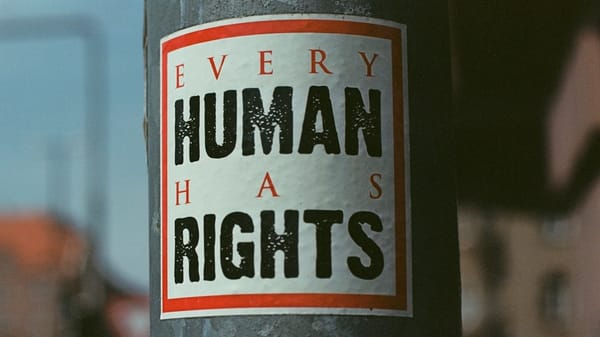One-Sided Conversations with Unmedicated Writers
Inspired by true events

INT. CONFERENCE ROOM — MORNING
Three circular tables are arranged into one large makeshift roundtable. At the head sits an accomplished black author of four novels. She’s also a writing professor at a prestigious B1G university.
Surrounding her are twelve conference attendees at various stages of their writing journey. The group composition is 23/2 Caucasian, evenly split between women and men, and the median age probably lies somewhere in the fifties.
The conversation is lively and energetic. The accomplished black author is charming and magnetic. Everyone’s learning and laughing and having a great time.
We join the event in progress.
UNMEDICATED WRITER
(Loud and slightly combative)
I have a question about representation, and about who’s allowed to write about what without fear of getting canceled — or whatever.
ACCOMPLISHED BLACK AUTHOR
Okay…
UNMEDICATED WRITER
Well, in my current novel I have a black character. He’s not the main character but he’s the main character’s best friend. And he’s based on my best friend growing up, so I know this character really well because he’s based on a real person. But I was told I couldn’t write this character because doing so would be cultural appropriation — or whatever — and I’d risk getting canceled.
ACCOMPLISHED BLACK AUTHOR
(Poker-faced)
Okay. Who told you this?
UNMEDICATED WRITER
A really famous, really well-known — like a New York Times-best-selling author. They said I wasn’t allowed to write about that kind of character and that — in the current cultural climate — I shouldn’t even bother trying to pitch a book with a black character because no agents will consider it and I should just stay in my lane.
ACCOMPLISHED BLACK AUTHOR
(Stoic)
Okay, I want to make sure I understand. The black character isn’t the main character, correct?
UNMEDICATED WRITER
(Mildly defensive)
Right. The main character is a white woman. The black character is her best friend, and he’s based on my best friend from childhood.
ACCOMPLISHED BLACK AUTHOR
Okay, well, in that case I don’t necessarily agree with the advice of that particular author. As long as you’re writing from experience, and you can make the story authentic, then I think that’s fine.
UNMEDICATED WRITER
(Vindicated)
That’s what I said!
ACCOMPLISHED BLACK AUTHOR
(About to get medieval)
But listen. Because this is an important topic.
The problems arise when people try to write about experiences they don’t understand. Or when they don’t do enough homework, or research, or talk to enough people, to create a well-rounded character — especially when the character’s not from the same type of background or culture as the writer. When writers do that, the character feels flat, and readers can tell they don’t know what they’re talking about.
For example, how many of y’all know about the talk?
TOKEN MINORITY
(Looks around the room, sees no hands raised, raises hand)
ACCOMPLISHED BLACK AUTHOR
And I’m not talking about the talk like the birds and the bees talk. [Laughter]
I’m talking about the talk. Meaning, if I say the talk to any black family in America, they’ll know what I’m referring to.
So, how many of y’all know about the talk?
TOKEN MINORITY
(Looks around the room again, sees no hands raised again, raises hand again)
ACCOMPLISHED BLACK AUTHOR
(Encourages token minority to speak up)
TOKEN MINORITY
It’s about police officers, and what to do if you’re pulled over while driving in a white space — where you’re not supposed to be — and how to comport yourself.
ACCOMPLISHED BLACK AUTHOR
(Nods her head)
Listen. I live forty-five minutes away. I drive back and forth from here twice a day. Every time I get in my car, I do the following: I take out my driver’s license, my vehicle registration, and my proof of insurance, and I set them on the passenger seat.
If I get pulled over, I roll down my window and put my hands on the wheel like this [demonstrates ten-and-two position]. When the officer gets to my window, I say, “Officer, my driver’s license, vehicle registration and proof of insurance are right there on the passenger seat. If you’d like to inspect them, they’re right there for you. But I’d prefer to keep my hands on the wheel and stay seated here, just like this.”
TOKEN MINORITY
(Nods along, glances around the room at the other attendees, who are all shook AF)
ACCOMPLISHED BLACK AUTHOR
[Releases ten-and-two position] That’s the reality I — and all black people — live with every day. It’s what it is.
So, my point is this: if you don’t even know about the talk, then you probably shouldn’t be writing from the perspective of a black character.
But I’m not going to say you can’t write from the perspective of a black character. I write non-black characters all the time. I’m just saying, if you’re going to, you have to take great care, and make sure you show respect for other peoples’ lived experience.
[Ten seconds of somber silence]
UNMEDICATED WRITER
(Assured)
And that all makes sense. So you know what I’m going to do?
ACCOMPLISHED BLACK AUTHOR
What’s that?
UNMEDICATED WRITER
(Uppity)
I’m going to stop working on my current novel, sell a different novel first, then come back to this novel — the one with the black character — and get it published and show everyone they were wrong, and I can do whatever I want.
ACCOMPLISHED BLACK AUTHOR
(God only knows what she’s thinking)
You do that then.
Some Notes on this Piece
This story is based on my best possible recollection of a real conversation that took place at a writer’s workshop a few weeks ago. I lightly paraphrased throughout for clarity. Details have been anonymized to protect the innocent — and unmedicated.
In my humble opinion, the accomplished black author’s take is spot on, capturing the appropriate level of nuance. Fiction writing necessarily requires writers to occupy different characters’ perspectives and mental states. If writers weren’t allowed to do that, there wouldn’t be many interesting stories out there.
In the novel I’m currently working on, my protagonist is modeled off me (#narcissism), but I have a black male supporting character, an Asian female supporting character, and tons of white characters.
As a multiracial person who’s lived a largely “white experience,” I feel confident in my ability to fairly represent the Caucasian characters. For the black and Asian characters, I’ll ask for sensitivity readers to assess their authenticity, and to ensure I haven’t cocked anything up.
In fact, even though this piece is based upon my own personal reporting, I had a black friend read it just to make sure none of my characterization had devolved into caricature. If it did, blame them, and don’t cancel me — or whatever.




